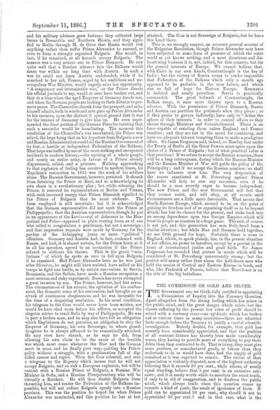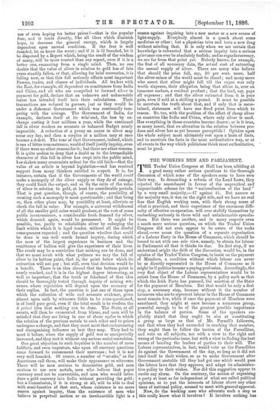THE COIAMISSION ON GOLD AND SILVER.
THE Government are, we think, fully justified in appointing a Commission of Inquiry into the Currency Question. Apart altogether from the strong feeling which has arisen in the public mind, and the great danger which exists lest the classes suffering by the present low rates of profit should be seized with a currency craze—an epidemic which has broken out at various times in many countries—there are admitted facts enough before the Treasury to justify a careful scientific investigation. Nobody doubts, for example, that gold has recently been considerably appreciated, and that the position of all contract debtors has thereby been made considerably worse, they having to provide more of everything to pay their debts than they contracted to do. That is to say, they must give more produce, or manufactured goods, or labour than they undertook to do or would have done, had the supply of gold remained as it was expected to remain. The extent of that appreciation is violently disputed, men of the highest authority believing that it exceeds 20 per cent., while others, of nearly equal standing, believe that 5 per cent. is an excessive esti- mate ; and it is surely worth while to ascertain the exact truth, if only to be rid of exaggeration, and to disabuse the public mind, which always tends when this question comes up towards a kind of panic, the result of ignorance of facts. If gold can be appreciated 10 per cent., why should it not be appreciated 50 per cent. ? and in that case, what is the use of even hoping for better prices ?—that is the popular fear, and it tends directly, like all ideas which diminish hope, to decrease the general energy, which is largely dependent upon mental condition. If the fear is well founded, let us know the worst ; and if it is ill founded, let it be dispersed by a Report which, being the result of the wisdom of many, will be more trusted than any report, even if it is a better one, emanating from a single mind. Then, no one doubts that the value of silver in relation to gold has of late years steadily fallen, or that, allowing for brief recoveries, it is falling now, or that this fall seriously affects most important Powers, trades, and classes of individuals. All traders with the East, for example, all dependent on remittances from India and China, and all who are compelled to forward silver in payment for gold, declare that an unknown and unknowable factor has intruded itself into their calculations. Their transactions are reduced to guesses, just as they would be under a dishonest Government which was continually tam- pering with the coinage. The Government of India, for example, declares itself at its wits'-end, the loss by ex- change costing it four millions a year, while the continued fall in silver renders an accurate or balanced Budget nearly impossible. A reduction of a penny an ounce in silver may occur any day, and then a surplus of a million may at once become a deficit. The tone of that Government, indeed, which is one of bitter remonstrance, would of itself justify inquiry, even if there were no other reasons for it ; but there are other reasons. It is quite useless to deny that a doubt as to the irremediable character of this fall in silver has crept into the public mind, has shaken many economists ardent for the old faith—that the value of an article is beyond legislation—and has received support from many thinkers entitled to respect. It is, for instance, certain that if the Governments of the world could make a monopoly of the silver supply as they do of coinage, they could limit the output, and so fix the ratio of the value of silver in relation to gold, at least for considerable periods. That is past question, though, of course, the possibility of creating such a monopoly is most questionable ; and that being so, then other plans may, by possibility at least, alleviate or check the fall in value. For example, a universal withdrawal of all the smaller gold coins would produce, at the cost of some public inconvenience, a considerable fresh demand- for silver, which demand, again, would be permanent. It might be possible, too, partly to rehabilitate silver by enlarging the limit within which it is legal tender, without all the direful consequences expected ; and the question whether that could be done is one well worth formal inquiry, during which the men of the largest experience in business • and the remittance of bullion will give the experience of their lives. The result may be a conviction that nothing can be done, and that we must await with what patience we may the fall of silver to its bottom point, that is, the point below which its extraction will not pay ; but still, even that decision would be a benefit. There is an idea abroad that the bottom point is nearly reached, and it is in the highest degree interesting, as well as important, that the truth or falsehood of that idea should be thoroughly tested through inquiry of mining wit- nesses, whose reputation will depend upon the accuracy of their replies. In fact, the question is just one of those upon which the collection of wide and accurate evidence, given almost upon oath by witnesses liable to be cross-questioned, is of itself pure good, even if the total result is to confirm the
priori idea that nothing can be done. The State, at all events, will then be exonerated from blame, and men will be satisfied that they are living in one of those cycles in which the relation of the precious metals to each other and to prices undergoes a change, and that they must meet that embarrassing and disorganising influence as best they may. They had to meet it before, when the supply of gold was so unexpectedly increased, and they met it without any serious social convulsion.
One great objection to such inquiries is the number of mere faddists, and even impostors, who upon all currency questions come forward to recommend their nostrums ; but it is not very well founded. Of course, a number of "cranks," as the Americans call them, will make their appearance as witnesses. There will be men anxious to demonetise gold, and men anxious to use new metals, men who believe that paper currency need not be convertible, and men who would intro- duce a gold currency into India without providing the gold ; but a Commission, if it is strong at all, will be able to deal with semi-lunatics of that sort, whose existence is no more reason against inquiry, than the existence of men who believe in perpetual motion or an inexhaustible light is a reason against inquiring into a new motor or a new source of light-supply. Everybody almost is a quack about some medicine or other ; but a physician tries and tests a new drug without minding that. It is only when we are certain that knowledge is exhausted that a serious inquiry into a serious grievance can ever be absolutely foolish; and as regards currency, we are far from that point yet. Nobody knows, for example, the first of all necessary data, the actual cost of extracting the annual supply of silver. There are many who believe that should the price fall, say, 10 per cent. more, half the silver-mines of the world must be closed ; and many more who assert that silver might fall till the rupee was only worth sixpence, their allegation being that silver is, over an immense surface, a residual product ; that the lead, say, pays all expenses ; and that the silver extracted from it is pure gain, even if sold at a shilling a pound. It must be possible to ascertain the truth about that, and if only that is ascer- tained, statesmen will have one fixed point from which to reason. So, too, with the problem of the effect of cheap silver on countries like India and China, where only silver is used. Has everything in those countries become dearer ; or is it true, as many assert, that no alteration in the relation between pro- duce and silver has as yet become perceptible ? Opinion upon the whole subject must ultimately rest upon a basis of facts, and to ascertain the facts in the most authoritative way, or at all events in the way which politicians think most authoritative, must be good.



































 Previous page
Previous page